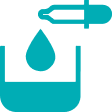Agricultural Runoff Testing
Protect Water Quality from Agricultural Contaminants
Agricultural runoff can introduce harmful chemicals, pesticides, and nutrients into water supplies, posing risks to human health and the environment. Our Agricultural Runoff Testing Services identify these contaminants, ensuring your water is safe and compliant with regulatory standards.
"*" indicates required fields
Why Agricultural Runoff Testing is Important
Runoff from farms, gardens, and agricultural operations often carries excess fertilizers, pesticides, animal waste, and other pollutants into nearby water sources. These contaminants can:

Harm Human Health
Pesticides and nitrates in drinking water are linked to conditions like cancer, developmental issues, and "blue baby syndrome" in infants.

Damage Aquatic Ecosystems
Excess nutrients, such as nitrogen and phosphorus, cause algal blooms, depleting oxygen levels and harming marine life.

Compromise Water Quality
Contaminants can alter water taste, odor, and safety, making it unsuitable for drinking or other uses.

Increase Regulatory Risks
Non-compliance with EPA standards for agricultural pollutants can result in fines and legal challenges.
Pro Tip: Agricultural runoff can affect not only private wells but also municipal water systems, especially after heavy rains.
Our Agricultural Runoff Testing Services
We offer comprehensive testing to detect and measure contaminants caused by agricultural activities, including:

Pesticides and Herbicides
Analysis for chemicals like atrazine, glyphosate, and DDT.

Nitrates and Nitrites
Commonly found in fertilizers, these can contaminate groundwater and pose significant health risks.

Phosphates
Excess levels contribute to algal blooms and water pollution.

Volatile Organic Compounds (VOCs)
Detect harmful compounds used in agricultural products.

Animal Waste Indicators
Testing for pathogens like E. coli and coliforms from manure runoff.

Sediment and Turbidity
Evaluate water clarity and sediment contamination, which can transport other pollutants.
Our Testing Process is Simple and Efficient
01.
Contact Us
Reach out to schedule your test at a convenient time for you.
02.
Choose Your Option
Some parameters, like pH and chlorine, conductivity, turbidity, can be tested momentarily with our on-site testing services for immediate results. Alternatively, opt for sample collection for comprehensive lab analysis.
03.
Sample Collection
04.
Receive Your Results
Get detailed, actionable insights from our reliable reports, helping you address any water quality concerns effectively
Who Needs Agricultural Runoff Testing?
Not Sure If You Need Testing? Contact Us for Guidance
Don’t wait for issues to arise—regular testing can prevent costly problems and health risks.
Our services are designed for:
Homeowners Near Farms: Protect your family from contaminants in private wells or municipal water supplies.
Farm Owners and Managers: Monitor runoff impact to ensure compliance and minimize environmental risks.
Municipal Water Suppliers: Ensure water meets safety standards for residents.
Environmental Agencies: Assess water quality in agricultural regions.
Property Buyers and Developers: Verify water quality in rural or agriculturally adjacent properties.
When to Perform Agricultural Runoff Testing
Seasonally: Test during planting and harvest seasons when runoff risks are highest.
After Heavy Rainfall: Increased runoff often elevates contaminant levels.
Near Livestock Operations: Regular testing ensures safety when animal waste may impact water quality.
If Changes Are Noticed: Sudden changes in water clarity, taste, or odor may signal contamination.

Benefits of Agricultural Runoff Testing

Health Assurance
Detect and mitigate harmful chemicals and pathogens.

Regulatory Compliance
Ensure adherence to EPA and local water quality standards.

Environmental Stewardship
Prevent ecosystem damage from agricultural pollutants.

Peace of Mind
Understand the impact of agricultural activities on your water supply.
Frequently Asked Questions
What contaminants are commonly found in agricultural runoff?
Common contaminants include pesticides, herbicides, nitrates, phosphates, VOCs, and pathogens like E. coli from animal waste.
How often should I test for agricultural runoff?
Testing is recommended seasonally, after heavy rainfall, or if you notice changes in water quality, such as taste, odor, or clarity.
Can agricultural runoff affect municipal water supplies?
Yes, especially during heavy rainfall or flooding. Runoff can introduce contaminants into reservoirs or rivers used for public water supplies.
What can I do if my water is contaminated by runoff?
We provide actionable recommendations, such as installing filtration systems, using reverse osmosis, or working with agricultural operations to mitigate runoff sources.
Does agricultural runoff testing comply with EPA standards?
Yes, our testing aligns with EPA and state guidelines, ensuring reliable and actionable results.